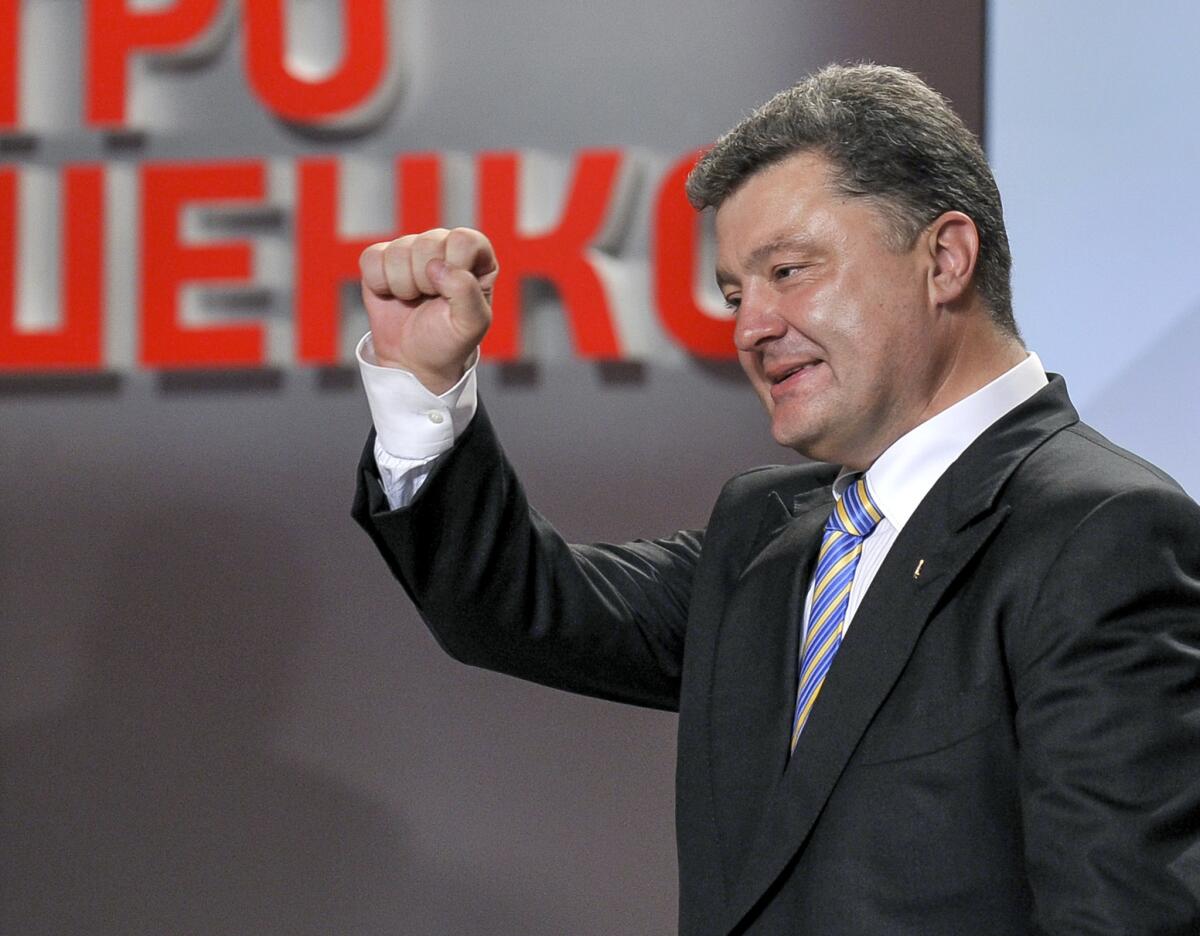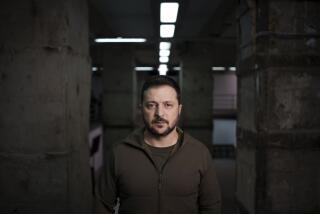Candy magnate declares victory in Ukraine presidential vote

Billionaire candy maker Petro Poroshenko appeared to win Ukraine’s presidential election Sunday, with an exit poll showing 55.9% supporting the candidate, who campaigned on promises to align Ukraine with Europe while also easing strained relations with Russia.
The exit poll based on 17,000 interviews at polling places around the country showed Poroshenko far ahead of former Prime Minister Yulia Tymoshenko, who was the choice of 12.9% of those interviewed by the Razumkov Center public opinion research firm. But with widespread disruption of voting in eastern Ukraine, it was unclear whether the exit poll was a reliable indicator of the national vote.
A separate poll by Ukrainian television stations gave Poroshenko 57% of the vote to Tymoshenko’s 12%.
Poroshenko took a victory bow on television just minutes after the exit poll results were announced, pledging that his first acts as head of state would be focused on “ending the war, chaos and disorder” and restoring unity to the divided country.
Tymoshenko also appeared on TV to say she considered the election to have been fairly conducted and would accept the results when they are announced.
If Poroshenko does capture more than 50% of the vote when results are tabulated, probably Monday, he will avoid the need for a June 15 runoff with the second-place finisher. That outright win would allay fears that three more weeks of uncertainty could result in further violence. At least 130 people have been killed in recent weeks.
Pro-Russia gunmen who have seized government buildings in the Donetsk and Luhansk regions along Russia’s border thwarted voting in at least two-thirds of the territory that is home to 6.5 million people, or about 15% of Ukraine’s population. The separatists, accused by Kiev’s interim government and its Western backers of being armed and encouraged by Russian President Vladimir Putin, had threatened election workers, kidnapped local advocates of Ukrainian unity and seized ballot boxes in the territory they insist is no longer part of Ukraine.
President Obama, on a surprise visit to U.S. troops in Afghanistan, praised Ukrainian voters for their courage in casting ballots despite the separatists’ threats and obstructions and said he looked forward to working with the next elected leader.
Obama said Ukrainians had shown their intention to choose a new leader “without interference,” a reference to the Russian aggression denounced by U.S. and European leaders as an effort by Putin to dominate the former Soviet state.
Poroshenko would succeed Kremlin-allied former President Viktor Yanukovich, who fled Kiev in February after a rebellion that culminated in violent reprisals against demonstrators in which more than 100 people were killed. The chocolate magnate was seen by many voters as a more pragmatic choice than Tymoshenko, whose years in government and opposition were times of intense division and discord in the country.
“We expect he will make us a European country, and that is what most people want now,” said 20-year-old Yulia Nosova after casting her ballot at a school in central Kiev near Independence Square, which was the epicenter of the rebellion and remains a memorial to those killed in the movement for fundamental change. Nosova, a hotel administration worker, described Poroshenko as “a diplomat who can work with everyone and put a new face on our country.”
Some voters expressed concern that electing another oligarch would perpetuate Ukraine’s strangling web of corruption, self-interest and political infighting.
“I support closer ties with Europe, as do the young people, but I worry that Poroshenko is a rich man who doesn’t understand the common people,” said Natalya Poprotskaya, a 63-year-old retired teacher who works at a museum to supplement her meager pension.
Some older voters said they cast their ballots for Poroshenko at the urging of their children.
“It’s so terrifying what is happening now, people being killed by people who are their neighbors,” said 80-year-old Nila Chekerda, whose four adult children encouraged her to back Poroshenko and his campaign promise of “living in a new way.”
Poroshenko also seemed amenable to Russia, where Putin and Foreign Minister Sergei Lavrov have lately described him as someone with whom they can conduct business. Poroshenko, 48, has confectionary enterprises in Russia and enjoyed a lucrative trade relationship with the neighboring market until last year, when Moscow imposed import restrictions on his Roshen chocolates, claiming they contained impure ingredients. The import barriers were seen as Kremlin pressure against Kiev’s plans to sign a trade and association deal with the European Union.
As he cast his ballot in Kiev, Poroshenko vowed to make disarmament of illegal militias his first order of business.
“I am convinced that this election must finally bring peace to Ukraine, stop lawlessness, stop chaos, stop bandit terror in the east,” Poroshenko told a crowd of journalists recording the ballot cast by the man whom most expect to emerge as president. “People with weapons must be removed from Ukrainian streets.”
Tymoshenko, who spent more than two years imprisoned during Yanukovich’s time in office for alleged corruption, dispensed with her signature braided crown when she cast her ballot, sporting a bun and headband.
“It is time to hold a referendum on joining NATO to restore peace in Ukraine,” Tymoshenko said after voting in her east-central home city of Dnepropetrovsk.
Russian media, including the official Itar-Tass news agency, reported Poroshenko’s commanding lead in the exit polls, proclaiming him the victor and casting his political agenda as one committed to hearing “the voice of every region of [Ukraine’s] composite country.”
That is read by the pro-Russia residents of Ukraine’s eastern regions as support for the Kremlin’s push for constitutional changes to decentralize power and give regional leaders the authority to decide how to use their tax revenue and what foreign economic collaboration is in their best interests. Many eastern Ukrainian factories and mines are closely integrated with Russian enterprises, and workers in the largely Russian-speaking rust belt had feared a turn from Moscow to Brussels would eventually mean closure of their uncompetitive production facilities and an uncertain future.
Yanukovich caved in to Kremlin pressure and abandoned the EU association agreement in November, angering Ukraine’s young, pro-Europe population and triggering the three-month rebellion that drove him from power.
After Putin deployed Russian troops to occupy Ukraine’s Crimean peninsula and annexed the territory following a dubious March 16 referendum, pro-Russia militants began seizing government buildings and broadcast facilities in eastern Ukraine and demanding their own independence. Donetsk and Luhansk regions, where pro-Russia gunmen have taken over local government control, held similar independence votes on May 11 and proclaimed themselves seceded from Ukraine.
Fear of Ukraine slipping into the orbit of the North Atlantic Treaty Organization, the military alliance that was the rival of the former Soviet Union, has been an instigation for the pro-Russia militants and their suspected Kremlin backers who see Ukraine’s political, economic and security overtures to the West as a threat to Russia’s traditional influence in the region.
Poroshenko has said that NATO membership shouldn’t be a priority for Ukraine as it provokes deeper division in this country already severed into Moscow-oriented eastern industrial areas and western and central regions seeking a place in the community of Europe.
Fighting in the east appeared to have died down on election day, but news agencies in the rebel-held cities described menacing patrols of masked gunmen visiting the closed polling places in Donetsk and Luhansk to ensure that no one had dared show up to cast a ballot. The Associated Press said one group of militants who had seized a ballot box from a Donetsk suburb made a show of smashing it in front of Western journalists’ cameras.
Word also reached Kiev of the deaths of two foreign journalists near the embattled town of Slovyansk, in the Donetsk region. Italian photographer Andrea Rocchelli and his Russian interpreter and assistant, Andrey Mironov, were hit by mortar fire Saturday during a battle between the pro-Russia gunmen and Ukrainian army troops manning checkpoints outside the town that has been at the center of the deadly clashes for the last two months.
More to Read
Start your day right
Sign up for Essential California for news, features and recommendations from the L.A. Times and beyond in your inbox six days a week.
You may occasionally receive promotional content from the Los Angeles Times.







